Clinton, Bush Continue String of Easy Victories : Primaries: They win handily in Washington and Oregon. Perot gets a significant number of write-in votes.
- Share via
Arkansas Gov. Bill Clinton and President Bush continued their easy glide toward the general election with primary victories in Oregon and Washington state Tuesday.
And the man likely to meet them in November, Texas billionaire Ross Perot, made his presence felt by winning a significant number of write-in votes.
Exit polls of voters in Oregon indicated that Perot’s name was written onto the ballot by more than one in 10 of Democrats and Republicans. Ballots with write-in names were not immediately counted Tuesday night. Since Oregon awards delegates only to those actually on the ballot, Perot will not win any convention delegates.
In Oregon, Clinton led his lone Democratic opponent, former California Gov. Edmund G. (Jerry) Brown Jr., by 53% to 32%, with 23% of the votes counted. Next door in Washington, where Democrats were holding a non-binding “beauty contest” primary, he led by 55% to 26%, with 31% counted.
Bush, who sewed up the Republican nomination in late April, was leading former television commentator Patrick J. Buchanan in both states--76% to 22%, with 18% counted, in Oregon and 83% to 13%, with 30% counted, in Washington.
Perot’s showing, although strong for a seemingly unplanned write-in candidacy, was presaged by his standing in polls leading up to Tuesday’s voting. A survey taken last week by Portland station KATU-TV showed that in a three-way general election matchup, Perot carried 42% of the vote in the state to Bush’s 31% and Clinton’s 21%.
Exit polls conducted by the four major television networks on Tuesday showed that Perot, expected to announce his independent candidacy soon, was viewed as favorably among Democrats as Clinton and among Republicans as Bush.
Apart from the Perot factor, the Pacific Northwest presidential primaries received minor billing, overshadowed in Oregon by a splashy and contentious battle for the Democratic nomination to challenge GOP Sen. Bob Packwood, who Tuesday easily won nomination for his fifth term.
In the Democratic race, millionaire businessman Harry Lonsdale was holding a slim early lead over U.S. Rep. Les AuCoin, an 18-year House veteran who was threatened with being the latest victim of the House check-bouncing scandal.
Clinton, speaking to reporters in Austin, Tex., as he left a $400,000 fund-raiser Tuesday night, dismissed the seriousness of Perot’s challenge.
“There is a life cycle that all these campaigns and candidacies have,” he said. “I’m very much at peace with this campaign. When we get into the fall, I’ll be able to get my message out there and my record . . . . I think the voters will perceive me as the outsider candidate with the best chance to effect change.”
At stake in Oregon’s presidential contest were 47 Democratic delegates, at least 30 of whom appeared likely to be awarded to Clinton. That put him less than 300 delegates away from the 2,145 needed for his party’s nomination.
Twenty-three Republican delegates were awarded in Tuesday’s Oregon voting--18 of whom went to Bush. Since Bush has already cinched the nomination, it was anticlimactic.
In Washington state, Bush could collect up to 35 GOP delegates. The Democratic winner will garner nothing but bragging rights--the state’s 71 delegates are being awarded in a caucus process that began on March 3.
Illustrating the underwhelming nature of the contests, neither Brown nor Clinton was anywhere near Oregon on Tuesday. Clinton campaigned in New Mexico and Texas before flying to Miami. Brown spent the day in Ohio, where he visited a sewage plant that environmentalists say is leaking into the Cincinnati water supply.
“We ought to clear up the toxic discharge and do it by hiring people who are out of work,” said Brown, who later campaigned at a Greek Orthodox Church in Cleveland.
The former California governor had been prepared for bad news. “We’re not doing well in Oregon,” he told reporters earlier in the week. Polls done by Oregon newspapers and television stations had tracked a surge by Clinton as the primary neared.
The weeks leading up to the Oregon and Washington contests were models of the late spring concerns of candidates. Challenger Brown flitted from California to West Virginia to Oregon and a host of other states, seeking support that has eluded him since his April victory in the Connecticut primary.
And Clinton, confident of winning the nomination, focused on readying his campaign organization for the fall general election.
In their forays into the Pacific Northwest, both candidates courted the environmental movement and tried to pay heed to the economic troubles that have dominated voters’ minds this year.
But in political circles, both men have been eclipsed by the looming presence of Perot. He told The Times this week that he would announce his candidacy “at the optimum time” and that he was working on the selection of a permanent running mate.
“I’ve got several million volunteers already, the numbers are incredible and it’s fascinating,” he said.
Exit polls from Oregon indicated the extent of Perot’s allure. Among Democrats, more than half had a favorable impression of Perot, statistically the same as had a good impression of Clinton. When asked how they would vote in a three-way general election, 45% sided with Perot and 41% with Clinton.
Among Republicans, almost six in 10 had a favorable impression of Perot, equal to that of Bush. The President was still leading among members of his own party in a hypothetical general election, pulling 49% to Perot’s 40%.
More to Read
Get the L.A. Times Politics newsletter
Deeply reported insights into legislation, politics and policy from Sacramento, Washington and beyond. In your inbox twice per week.
You may occasionally receive promotional content from the Los Angeles Times.











